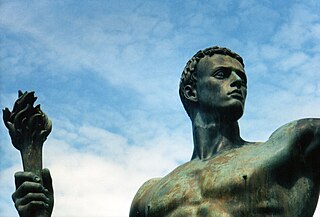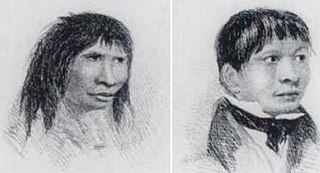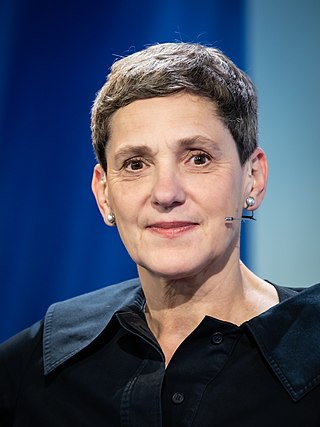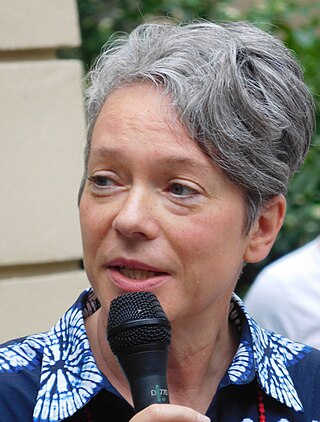
Julia Voss (born 1974) is a German journalist and scientific historian. She is a writer and art critic who works at the Frankfurter Allgemeine Zeitung . [1]

Julia Voss (born 1974) is a German journalist and scientific historian. She is a writer and art critic who works at the Frankfurter Allgemeine Zeitung . [1]
Voss was born in Frankfurt am Main, West Germany. She majored in modern German literature, art history and philosophy at University of Freiburg, Humboldt University in Berlin and at Goldsmiths College in London. [1] She received her master's degree in 2000 with a thesis on the literary forms of the debate on Darwinism (Literarische Formen der Darwinismus-Debatte).
From 2001 to 2004, Voss pursued her art history dissertation, One long Argument. Die Darwinismus-Debatte im Bild as part of a research project at the Max Planck Institute. She examined the role of images in the development of Charles Darwin's theory of evolution. She received her doctorate at Humboldt University at the end of 2005 and was presented the Max Planck Society's Otto Hahn Award for her dissertation. Her dissertation was published in 2007. [1] In 2008, she wrote an article about Michael Ende's children's novel, Jim Knopf und Lukas der Lokomotivführer , in which she examined Ende's motives for writing the book. Written in 1960, Ende's novel is a classic in Germany and has been translated into 33 languages. [2] In her article, called "Jim Button saves the theory of evolution" ("Jim Knopf rettet die Evolutionstheorie"), Voss presented evidence that Ende wanted to write a contrast to Nazi racial ideology and their misuse of Darwin's theory of evolution. [3] Ende, who had grown up in Nazi Germany, used numerous Nazi symbols and references in his book, reversing their discriminatory aspect and turning them into anti-racist and multi-cultural images. [4] Voss' article also identified Jemmy Button as the basis for Ende's lead character, Jim Knopf, translated in English as Jim Button. [3] [4]
Voss received the Sigmund Freud Prize for Scientific Prose from the Deutsche Akademie für Sprache und Dichtung for her study of Darwin's theory of evolution in 2009. In 2009, she also served on the jury of the Venice Biennale. [1]

August Friedrich Leopold Weismann FRS (For), HonFRSE, LLD was a German evolutionary biologist. Fellow German Ernst Mayr ranked him as the second most notable evolutionary theorist of the 19th century, after Charles Darwin. Weismann became the Director of the Zoological Institute and the first Professor of Zoology at Freiburg.

Michael Andreas Helmuth Ende was a German writer of fantasy and children's fiction. He is known for his epic fantasy The Neverending Story ; other well-known works include Momo and Jim Button and Luke the Engine Driver. His works have been translated into more than 40 languages and sold more than 35 million copies.

The master race is a pseudoscientific concept in Nazi ideology in which the putative "Aryan race" is deemed the pinnacle of human racial hierarchy. Members were referred to as "Herrenmenschen".

Edgar Karl Alfons Ende was a German surrealist painter and father of the children's novelist Michael Ende.

Orundellico, known as "Jeremy Button" or "Jemmy Button" or "Jimmy Button", was a member of the Yaghan people from islands around Tierra del Fuego in modern Chile and Argentina. He was taken to England by Captain FitzRoy in HMS Beagle and became a celebrity there for a period.

Alfred Kerr was an influential German theatre critic and essayist of Jewish descent, nicknamed the Kulturpapst.

Ernst Klee was a German journalist and author. As a writer on Germany's history, he was best known for his exposure and documentation of medical crimes in Nazi Germany, much of which was concerned with the Action T4 or involuntary euthanasia program. He is the author of "The Good Old Days": The Holocaust Through the Eyes of the Perpetrators and Bystanders first published in the English translation in 1991.
Jim Button and Luke the Engine Driver is a children's novel written by Michael Ende. The main characters are Emma the steam locomotive, her driver Luke and the young accomplice Jim Button who together go on an adventure. The story begins and ends on the small fictional island of Morrowland.

Herfried Münkler is a German political scientist. He is a Professor of Political Theory at Humboldt University in Berlin. Münkler is a regular commentator on global affairs in the German-language media and author of numerous books on the history of political ideas, on state-building and on the theory of war, such as "Machiavelli" (1982), "Gewalt und Ordnung" (1992), "The New Wars" and "Empires: The Logic of World Domination from Ancient Rome to the United States". In 2009 Münkler was awarded the Leipzig Book Fair Prize in the category "Non-fiction" for Die Deutschen und ihre Mythen.

Roger Willemsen was a German author, essayist and TV presenter.
Margret Antonie Boveri was one of the best-known German journalists and writers of the post-World War II period. She was a recipient of the German Critics' Prize and the Bundesverdienstkreuz.

Felicitas Hoppe is a German writer. She received the Georg Büchner Prize in 2012.

Ernst Peter Fischer is a German Historian of Science and Publicist.

Marlene Streeruwitz is an Austrian playwright, novelist, poet, and short story writer.
Elisabeth Eleonore Büning is a German music journalist and writer, known for her opera reviews in the Frankfurter Allgemeine Zeitung.
Gerd R. Ueberschär is a German military historian who specialises in the history of Nazi Germany and World War II. He is one of the leading contributors to the series Germany and the Second World War and, together with Rolf-Dieter Müller, is the author of Hitler's War in the East 1941−1945: A Critical Assessment. Both works have been published in English translations.

Ina Hartwig is a German writer, literature critic and academic lecturer. From July 2016, she has been Kulturdezernentin in Frankfurt, the city councillor responsible for culture and science.

Silvia Bovenschen was a German feminist literary critic, author and essayist.
Martha Wertheimer was a German journalist, writer and rescuer who came from a Jewish family. Before World War II, she oversaw the operation of the Kindertransport from south and southwest Germany. She died in the Holocaust.
Stefan Koldehoff is a German journalist, art market expert and non-fiction author. He became known through numerous publications and his work as culture editor of the Deutschlandfunk.